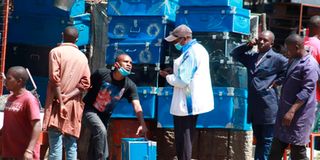How to create more jobs by pushing up productivity

Customers buying metallic boxes preferred by most school going children, on Ladhies Road, Nairobi on Sunday, January 3, 2021.
What you need to know:
- There is a dearth of formal leadership training and development, particularly the role of the leader in driving industrialisation.
- Leaders must take steps to develop skills to lead our wonderful country to industrialise.
Without manufacturing, we cannot increase productivity in agriculture and in services. Without increases in productivity, we cannot increase incomes, nor create more jobs. Our most urgent national interest is, therefore, to industrialise. It is to build a manufacturing base, because without it, we will remain a lower middle-income society.
Simply put, we want our farmers to use machines and modern tools. Who is making those machines and tools? We want our farmers to irrigate. Who is making the irrigation equipment? We want high quality non-farm jobs. Where will they come from?
Take a smallholder with five acres in central Laikipia. It is obvious that if she has a hand-held tiller, she can complete the whole farm in a day. But she will take a full week if she is tilling by hand. There are millions of small holder farmers in Kenya today. That is potentially the market for hand-held tilling machines.
Iron ore, the raw material used to make steel, which is used to make machines, is plentiful in Kenya. In Laikipia, Samburu, Kwale, Taita Taveta, Tharaka Nithi and elsewhere. In fact, most of the murram used to make gravel roads is laden with iron! In Kieni, most gravel is full of aluminium.
Take the Gikomba micro business, making steel boxes for students. Or Mr Kagiri in Nanyuki making chaff cutters. To increase their productivity requires that they make more boxes or chaff-cutters per unit of time. That means they have to use machines, so they can make many more chaff-cutters and boxes.
Driving industrialisation
This is the same argument for mass production. We romanticise hand made, and cottage industry, but to create hundreds of jobs requires that we move to mass production.
Take the competence-based education that is now a major debate in the country. The truth is that most of us educated for white collar jobs cannot even make a tooth pick. Now we all accept that if you want to be an engineer, doctor, nurse, teacher and so on, in practically all fields, you spend many years learning within formal settings.
But, there is a dearth of formal leadership training and development, particularly the role of the leader in driving industrialisation. In addition, there is no training on actual production. Even in engineering, you will hardly find a production engineer. One who can design and build a production line, be it in food processing or heavy manufacturing.
Leaders must take steps to develop skills to lead our wonderful country to industrialise. As we look towards the election, it is clear that the key issue is the economy. How to make it work for all of us. It does mean that we have to go beyond the slogans and interrogate what the various promises being made mean.
For all this to happen we must also be willing to change our mindsets. Most of us do not believe that we can manufacture. This is reflected in the systems and policies that we make. This must change.
Ndiritu Muriithi is the independently elected governor of Laikipia. @NdirituMuriithi





